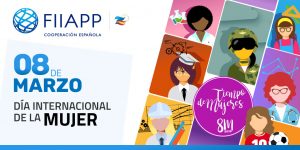-
|
28 March 2019
|Posteado en : Reportage
International Women’s Day has become one of the most strongly supported international days of the year. At FIIAPP, we are aware of the importance of gender inclusion in our projects and we are committed to an equality plan within the Foundation
Currently, around 7.55 billion people inhabit the planet. According to United Nations data, 49.5% of these are women, which translates into 3.71 billion.
There are many obstacles that women face by simply being women. The OECD report “The Pursuit of Gender Equality: An Uphill Battle”, shows that women are still at a disadvantage in all areas of life and in all countries with respect to men.
The Global Wage Report 2016/2017 prepared by the International Labour Organization (ILO) highlights that the wage gap increases as wages increase. According to data in a Eurostat report, in Spain in 2016, the gender wage gap was 14.9% compared to a European average 16.7%.
Likewise, of all the people living in extreme poverty, 75% are women and girls. Of the total number of children who do not attend school, 60% are girls and, although women account for half of the food produced, they only own 1% of cultivated land.
8 March, International Women’s Day
 International Working Women’s Day was institutionalised by the United Nations on 8 March 1975 under the name International Women’s Day. However, the day was celebrated for the first time on 19 March 1911 in Europe, specifically in Germany, Austria, Denmark and Switzerland, and since then its commemoration has expanded to other countries.
International Working Women’s Day was institutionalised by the United Nations on 8 March 1975 under the name International Women’s Day. However, the day was celebrated for the first time on 19 March 1911 in Europe, specifically in Germany, Austria, Denmark and Switzerland, and since then its commemoration has expanded to other countries.Year after year, 8 March has become one of the international days with the greatest impact on society, as it has become a day marked by a global call-to-arms in which women join forces to demand gender equality and a fair society. An ever increasing number of men are joining in and becoming aware of the problem of inequality that women face.
“Gender equality is, fundamentally, a matter of power. We live in a world dominated by men, with a culture that is dominated by men. “Only when we understand the rights of women as a common goal, as a path to change for the benefit of all, will we begin to tip the balance“, the Secretary General of the United Nations, António Guterres highlighted in his message for World Women’s Day in 2019.
“Think equal, build smart, innovate for change”
In 2019, the slogan for International Women’s Day has been “Think equal, build smart, innovate for change”. This slogan places innovation by women at the centre of their efforts to achieve gender equality, since this requires social innovations that are valid for both men and women “leaving nobody behind“.
#Metoo movement
In a similar way to 8 March, women are also joining forces to raise their voices to advocate for gender equality through the #Metoo movement, which has become a protest movement that is active 365 days of the year. Through it, women around the world have had the opportunity to write about their experiences on social networks, reporting cases of sexual abuse and receiving support.
SDG 5: Gender equality
According to the United Nations, “gender equality is not only a fundamental human right, but the foundation needed to achieve a peaceful, prosperous and sustainable world“. In order to fulfil the objectives of the 2030 Agenda, gender equality has been included as the fifth of the Sustainable Development Goals . The wide-ranging aims of this goal include seeking to put an end to all forms of discrimination against all women and girls everywhere, eliminating all forms of violence against them, the adoption and strengthening of sound policies and the applicable of legislation to promote gender equality.
Likewise, people with disabilities also suffer from gender inequality, especially when it comes to access to education. According to Ola Abu Ghraib, Director of Research and Global Influence at the Leonard Cheshire Organisation, “mechanisms must be improved to integrate girls with disabilities into the education system, and to integrate gender into the 2030 Agenda”.
FIIAPP and gender mainstreaming
On the occasion of International Women’s Day, on 7 March, FIIAPP held a round table that was attended by the Government Delegate for Gender Violence, Pilar Llop Cuenca, and the Director of the Spanish Observatory on Racism and Xenophobia (OBERAXE), Karoline Fernández, who highlighted the discrimination suffered by immigrant women in our society. The conclusion of this debate was the importance of “mobilising and raising awareness about gender violence through education“.
FIIAPP wants to position itself as the first Spanish foundation active in the field of public sector cooperation to apply gender inclusion both internally and externally. The Foundation is, therefore, developing an equality plan that aims to offer the same opportunities to men and women within the institution.
Similarly, FIIAPP is already working with various projects that have this gender insertion, such as EUROsociAL+ , EL PacCto:Support to AMERIPOL and the Convivir sin discriminación project.
According to Manuel Sánchez, a project technician with FIIAPP, the Foundation “has two main challenges: one is to include a focus on gender within the foundation with a plan and a specific programme for this, and on the other hand the responsibility we have as male and female workers to incorporate this into our projects.






